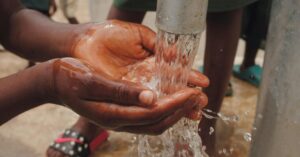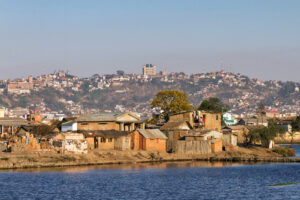Don’t forget the security aspect of the COVID-19 crisis
The Covid-19 crisis must be tackled not only as a threat to health but also as a socio-economic risk. In fragile regions such as the Middle East this demands a strong focus on reducing tensions and building resilience, writes Maria Vink, Director Transboundary Water Cooperation in this blog post.
SIWI works in many of the world’s most conflict-affected regions, such as the Middle East, the Horn of Africa and Central Asia. Through our Shared Waters Partnership programme, and the UNESCO International Centre for Water Cooperation, we support dialogues and cooperation over shared water resources.
The Covid-19 pandemic is making this work increasingly difficult but also more important than ever.
In addition to the enormous challenges associated with reducing the spread of the Covid-19 virus, the global economic standstill has had dramatic effects in many countries. Many sectors are impacted, including international tourism, which is often an important source of income for many countries. The steep drop in oil prices adds to the crisis as it has a huge impact on many economies, not least in the Middle East. WHO warns that the spread of Covid-19 has not yet reached its peak in many regions, and many countries lack sufficient capacity to respond adequately to a crisis of this magnitude.
It is not hard to imagine how this can escalate into a larger socio-economic crisis. Before the pandemic, several countries in the Middle East and Northern Africa were already (for example Iraq and Lebanon) experiencing unrest. Demonstrators called for governments to fulfil their basic functions to provide public services such as access to safe water. Such protests could become more frequent if the pandemic escalates, economies collapse, and social contracts are perceived to be broken. The situation is also affected by the global increase in disinformation campaigns, adding to the threat of long-term national stability in many countries.
In response to the crisis, we see closed borders and examples of a rise in nationalistic sentiments. At the same time, the transboundary rivers continue to challenge national borders as they always have – the Nile is for example shared by 11 different countries. The transboundary rivers hence constitute a stark reminder that cooperation between countries is essential, not least to increase resilience to disasters. Experience shows that shared water resources can contribute to conflict prevention as it often serves as an entry point for sustained dialogue and cooperation when other more polarizing issues make dialogue between parties difficult.
At SIWI, we will continue to push for more sustainable management of water resources, raising awareness of the benefits associated with transparency and cooperation. We facilitate dialogues and share best-practice examples from water diplomacy processes. In addition, we are now intensifying our work with capacity-building on topics such as how to tackle disinformation campaigns and dangerous rumours – a growing threat in times of crisis. It is important to act now, to counter growing tensions.
The current crisis could also be turned into an opportunity; it could become a catalyst for a societal transformation into a more sustainable future. People and states have become acutely aware of the global interdependences of economies and the importance of collective, multilateral approaches. No country alone can prevent such occurrences or mitigate their impact. Building resilience is key to limiting the impact of future disasters, which could have large negative implications for nations’ economic, social and political stability. Future efforts to strengthening resilience to pandemics could also have a positive impact on other sectors, and vice versa as building more resilient systems will increase the overall capacity to maintain functions in the face of external stresses.
The need for more holistic approaches which link solutions to climate change, global health, energy, water and political stability is increasingly evident. As an example: the water sector in Central Asia and Afghanistan could play a key role in post-crisis recovery. The region’s 8.4 million hectares of irrigated agriculture contributes around 20 per cent of the regional GDP, employs a large percentage of the population and plays a key role for food and energy security. Such investments could become an important catalyst for enhanced cooperation and make the region more resilient, not only to pandemics but also to climate change and associated economic threats.








